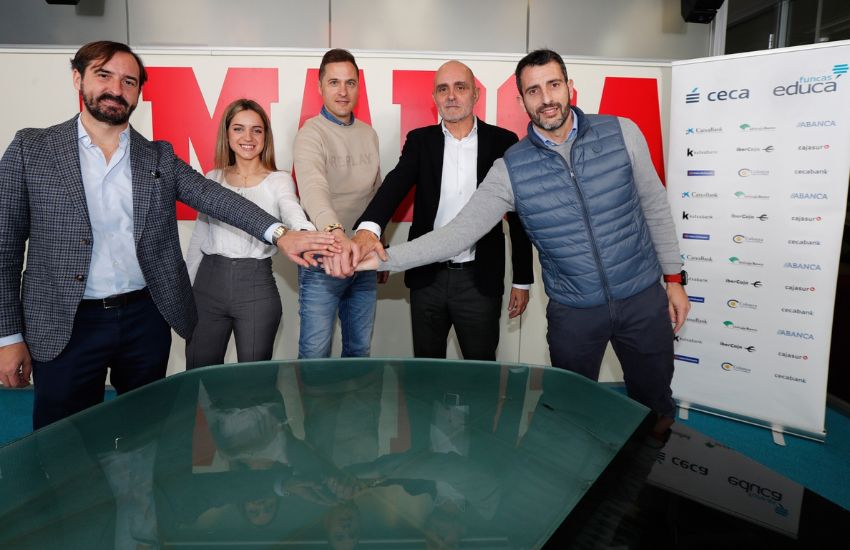CECA, RFEF and CEF.-UDIMA develop a plan that focuses on the financial education of athletes
Last week, a reflection by Javier Aguirre, Mallorca's coach, on the need to educate players on how to invest their money well, spread like wildfire on social media. This is an issue almost as old as football, players drawn into bad financial decisions, something that does not only affect those with million-dollar contracts and good advisors at their side.
This is the context of the initiative involving CECA (Association of Banks and Savings Banks), the Royal Spanish Football Federation and the Centro de Estudios Financieros (CEF.-UDIMA).
The aim is to provide players with the necessary education and information that will help them make decisions that will be vital to their future.
Alberto Aza, on behalf of CECA, explains the aim of the courses that already involve more than 700 athletes. "There was a genuine need. Elite athletes have very, very complicated schedules. They devote a lot of time to personal development, training, competitions and don't really have too many avenues to get up to speed financially. The idea is to give them more control over their financial reality and to enable them to plan beyond their successful careers".
José Antonio Culebras, head of education for the national team's youth squads, has seen it all in his time in the locker rooms of professional teams. "I have always had a special sensitivity towards this subject, a lot of curiosity. Now, I will also focus on mentoring. There are many situations that you read about, that you see in news reports, that sadden you very much. It is important to provide athletes with the tools to make as few mistakes as possible, to count to 10 before deciding. Why wait until the day after you retire to manage your money properly? Where we do not collect information, we need to receive education".
This project is not just about footballers and coaches. Referees are not left on the sidelines and play a very active part in the development of the programme. Speaking is Madrid-born Alicia Espinosa, who in addition to officiating matches in the Iberdrola League, also holds a degree in Aerospace Engineering. "I find this initiative very interesting from the point of view that, as rightly said, the career of an elite athlete is a very short career. Significant income is received in a very short period of time. It is therefore important to be forward-looking. On the other hand, when you are a top-level athlete, you cannot normally work in anything else. Your professional career is almost exclusively limited to sport, which is also the case with professional refereeing, because we are also just like any other athlete. This is why I believe that these types of initiatives are essential".
The Centro de Estudios Financieros has joined this project. "We are new to this project. We are enthusiastic about this initiative, because we believe that we can really do something interesting and necessary. The RFEF understands that this is a necessity, which is important considering that they are who are closest to these professionals. It is a pleasure to contribute and to give it continuity", explains Arturo de las Heras on behalf of CEF.-UDIMA.
The goal is to have well-rounded and better educated athletes.
A commitment by the RFEF
The Financial Education Course is open to any Federation that wants to join the initiative (comunica@ceca.es; 649463005). The Football Federation is one of the pioneers in a project in which the Higher Sports Council (CSD - Consejo Superior de Deportes) also plays an important role in its mission to protect the athlete beyond the period in which their activity places them in a bubble where they see little of the future. At the Federation's headquarters, Israel López, the RFEF's Director of Training and the National Coaching School, analyses the project and what it entails.
QUESTION. What are the implications of this alliance between CECA and the RFEF?
REPLY. Education is a strategic pillar for the RFEF, necessary to be at the forefront and continue to be a benchmark, which is why we are very proud to have added the Financial Education programme organised by CECA and CEF.-UDIMA to our extensive range of educational courses.
Q. Why is finance important in the life of an athlete?
R. Being financially literate, regardless of one's professional level, is vital to people's day-to-day lives, which is why we see this project as an additional and necessary service for our coaches, referees and players. Regardless of whether you can rely on expert financial advisors, a basic knowledge of finance is essential.
Q. What would you highlight from this course?
R. It is a very dynamic course, with a flexible format, real success stories of athletes and with a syllabus that is fully adapted to the needs and pace of the athletes, which is the target audience that we at the RFEF are focusing on. Whatever we can contribute and continue to share with them on a day-to-day basis is beneficial with a view to providing them with direct skills in this respect. Training and education is a holistic, all-encompassing process that cuts across all fields. And this one is important.













